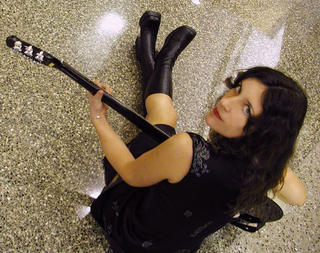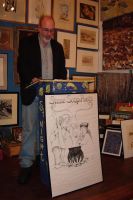
June Gross, the widow of Ed Hogan, the founder of Somerville's Aspect Magazine and Zephyr Press, gave me Ed Hogan's small press collection. Here is only a partial list of what's in the collection. I am going to approach several university libraries about starting an Ed Hogan collection. He was a very significant figure in the small press. Doug Holder
William Corbett-cassette tape- ( Zoland Books Cambridge, Mass.) "Readings from On Blue Note."
William Corbett-book- On Blue Note- ( Zoland Books -) 1989.
Country Pleasures. John Gill. ( The Crossing Press 1975)
We, The Generation In The Wilderness. Ricardo Feierstein. ( Ford-Brown&Co. 1989)
Circle Meadow. Gerald Hausman. ( Bookstore Press- 1972)
Winter Bells. W.D. Ehrhart. ( Adastra Press- 1988)
Poems: Wadsworth Handbook and Anthology. ( Wasdworth Publishing Company-1969)
The Testament of Israel Potter. William Doreski. ( Seven Woods Press- 1976)
Gerard Manley Hopkins Meets Walt Whitman In Heaven and Other Poems. P. Dacey. ( Penmaen Press 1982)
War Stories. H. R. Coursen .( with letter from the author to Hogan) ( Cider Mill Press 1985)
Root Song. Cid Corman. (-Potes and Poets Press-1986)
Harmatan. Paul Violi. ( SUN NY-1977)
Morning Passage. Janine Pommy Vega. ( Telephone Books) 1976.
Pocahontas Discovers AmericA. Miriam Sagan. (with announcement from the press: "She belongs to that group of small press poets who have not made it to the poetic 'big time,...' ( Adastra Press- 1993)
Leaving The Temple. Miriam Sagan. (signed by author.) ( Zephyr Press. 1984)
Acequia Madre. Miriam Sagan. (with letter to Hogan from author.) ( Adastra Press. 1988)
Vision's Edge. Miriam Sagan ( with letter to Hogan from author) (Samisdat 1978.)
The Drunken Boat. Eric Greinke. ( Free Press-1975)
Changing Faces Betsy Scholl. (autographed by author.) ( Alice James Books 1974)
Buffalo Poem. Nathan Whiting. (Pym-Randall Press. 1970).
The Adastra Reader. Gary Metras. ( Adastra Press 1987)
World Alone. Mundo A. Solas. Vicente Aleixandre. ( Penmaen Press 1982)
The Outer Banks. W.D. Ehrhart. signed by author. ( Adastra Press-1984)
Evidence of Johnny Appleseed. Robert Dunn. (1975)
The Avenue Bearing the Initial of Christ. Galway Kinnell. ( Houhton Mifflin- 1974)
After the Storm. Poems of the Persian Gulf War. Edited by Jay Meek& F. D. Reeves ( Maisonneuve Press 1992)
Life According to Motown. Patrica Smith. (with inscription from poet to Hogan.) ( Tia Chucha Press Chicago 1991).
Frank. An International Journal of Cotemporary Writing and Art. Winter 1997/8.
Channel. Barbara Jordan. ( Beacon Press- 1990).
Freeway Problems and Others. Lawrence P. Spingarn. (signed by author. )( Perivale Press. 1970)
Runaway Pond. William Corbett. ( Apple-Wood books 1981)
Rival heavens. Keith Althaus. ( Provincetown Poetry Series-1993.)
Riversongs. Michael Anania. signed by the poet. ( Uni. of illonois Press-1978)
Oriental Woman with Various Flasks. letter from author to Hogan included. (Lennox Blvd Books 1978)
In Baltic Circles Paul Violi (Kulcher Foundation-1973)
Quicksand Through The Hourglass David Morice. ( The Toothpaste Press-1980)
St. Patrick's Day. Wiliam Corbett. (Arion's Dolphin-1976)
Half of the Map. William Doreski. ( Burning Deck Press-1980)
A Cantata for Ground Hog Day. Bob Dunn. (Greenleaf Books-1971)
Hearts In Space. Maureen Owen. (Kulcher foundation-1980)
In The Americas. Robert Bohm ( Panache books, Inc...-1979)
Notes from New York and other Poems. Charles Tomlinson. ( Oxford Univ. Press-1984)
Noise and Smoky Breath. Edited by Hannish Whyte. ( Third Eye center-1983)
Where Rivers Meet. Bob Arnold. ( Mad River Press-1990)
Rafting Quivet Creek. Tom Bridwell (salt-Works Press-1976)
Winning Hearts and Minds. War Poems by Vietnam Vets. (1st Casualty Press-1972)
Willingly. Tess Gallagher (Graywolf press-1984)
Personal Effects. Robin Becker. Helena Minton. Marilyn Zuckerman. ( Alice James-1976)
Cache. Bob Arnold. 9 (Mad River Press-1987)
The Poets's Encyclopedia. (Unmuzzled Ox Editions-1979)
The Bend,The Lip,The kid. Jaimy Gordon. ( Sun NY 1978)
The Outer Banks and Other Poems. W.D. Ehrhart. ( Adastra Press-19840
Hawker. Robert Peters. ( Unicorn Press-1984)
The Gift to be Simple. Robert Peters.( Liveright Press-1973)
Shooting Stars. M. LaBare ( swollen Magpie Press-19820
Beasts in Clothes. Harold Witt. ( The MacMillian Press-1961)
Don't Think: Look William Corbett (signed by Corbett with note to Hogan) (Zoland 1991)
Mondo Barbie. edited by Lucinda Ebersole and Richard Peabody.( st. Martins-1993)
Back Talk. Robin Becker. ( Alice James-1982)
Quarry. Carol Oles ( Univ. of Utah Press-1983.)
Mocking BirdWish Me Luck. Charles Bukowski. (Black Sparrow 1972)
Burning In Water/Drowning In Flame.Charles Bukowski. (Black Sparrow-1974)
I'm In Love With The Morton Salt Girl. Richard Peabody ( Paycock Press)
Just For Laughs. W.D. Ehrhart ( Vietnam Generation Inc&Burning City Press-1990)
Well Spring. Sharon Olds. (Alfred Knoph--1996)
Botulism. Frederic Will. ( Micromegas Chapbooks-1975)
Crossing The River Twice. Stratis Haviara. (Clevland State University Press-1976)
Running Backwards. Barbara A. Holland (signed by Holland) Warthog Press-1983)
Play the Piano Drunk. Charles Bukowski. ( Black Sparrow-1979)
Sure Signs. Ted Kooser. ( with a review by Hogan inserted) ( Univ. of Pittsburgh Press-1980)
Contend with the Dark. Jeff Schwartz. Against That Time. Ron Schrieber. ( with review by Jim Kates enclosed) (Alice James-1978)
A Limerick Rake. Desmond O'Grady. ( Gallery Books-1968)
The Old Chore. John Hildebidle. ( Alice James-1981)
Sounds of the River Narvanjana. Armand Schwerner. ( signed by author with note to Ed Hogan)
Avelaval. Lindsay Hill. (Oyez-1974)
A Local Habitation and a Name. Ted Kosser. (Sole Press-1974)
1990. Michael Klien. ( Provincetown Town Arts Press-1993
Tree Taking Root. David Wilk. ( Truck Press- 1977)
Soon It Will be Morning. Michael Hogan. ( Cold Mountain-1976)






























































